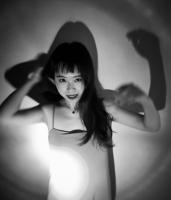Yunfei Li describes her music as inspired by a diversity of influences, from traditional Chinese culture to nature sounds to dance and pop music. Her award-winning music has been performed by a number of ensembles across the United States, including in Kansas City where she is currently a doctorate student in Music Composition at The University of Missouri-Kansas City Conservatory. Thank you to Yunei for taking time to share some insights into her music and creative process.
*
Please introduce yourself. Describe the kind(s) of music you compose.
My name is Yunfei Li. I am a composer. I am currently living in Kansas City while I study in the doctoral program in music composition at the University of Missouri at Kansas City. I write music characterized by exploring new sounds on instruments and music software. I take inspiration from the sounds of nature and have converted nature sounds into musical language as part of my original compositions. Some of my pieces were inspired by Chinese traditional culture and music. My compositions include solo instrumental, chamber, large ensemble, digital and mix media, and film. “Diversity” is my favorite word, and this word can be applied to my music. I write classical, electronics, film, dance, and pop music. I am currently working on some commissions for dance, some solo/duo pieces, and wind ensemble. As a listener, I also enjoy listening to all different genres of music.
Describe your journey to pursuing a doctorate in Music Composition at UMKC. Why did you want to study here?
I was born in a small town in China. When I was a little, my dad borrowed an electronic keyboard for me, and I remember I really enjoyed playing it and I could play all songs I can sing with accompaniment in my left hand. My parents were surprised by me and then they brought me to visit a local music teacher. After I met my music teacher, I decided to learn to play the violin because he said violin is the hardest instrument to learn! I thought why don’t learn the hardest one. I always like to challenge myself even now! I started to play the violin at the age of six.
When I was 11 years-old I left my hometown and went to a boarding school, which is a “music conservatory style” school for children. I studied violin performance at that time, and then later I began composing my own music in high school. I learned to use software to make music, and I got really deep into pop songs and film music during that time. I studied at the Central Conservatory of Music for my bachelor’s degree in music production and then completed my master’s degree at UNC-Greensboro in music composition before beginning my doctoral degree at UMKC.
The reason I chose UMKC for my ultimate degree is because the composition faculty there is outstanding. All of them have strong musical backgrounds and they're all making amazing music. More importantly, each one of my professors has their own unique way and style to create music. I love to study different techniques and learn new ways to create music from them. Each of them can bring a lot of ideas to me. In addition to their expertise in music composition, I really appreciate their mentorship and influence in my life, not only in music, but also because they are great people. I truly believe that a great composer should be a great human being first. Thus, the faculty is definitely the main reason that I decided to go to UMKC.
Describe your creative process. What tools do you use when composing?
Overall, a pencil; a piece of paper; and a keyboard are my compositional tools.
I have a lot of ideas when I compose. The spark could be a word, or a melody, or a rhythmic pattern, or some chords. I usually write those ideas down on paper, and play it on a keyboard, listen again and again, then use a pencil to shape the structure and make it logical in a musical way. Once I have the ideas and structure of a piece, I’ll start working on it through Sibelius, or Logic X, or Live Ableton. The type of software I use depends on who I am composing for. For example, recently I’ve been working on a piece for dance, so I am using Logic X to produce this piece. Also, I am working on another piece for small ensemble, which will be performed in the Atlantic Music Festival this summer. I am using Sibelius to write it.
What are the biggest challenges for you in terms of creativity?
The biggest challenges for me in terms of creativity are narrowing down my ideas when I compose a piece. Sometimes it’s a hard decision because I really like every idea and I want to put them all in one piece. However, I want to keep the piece focused and really concentrate on one or two ideas, so I have to make hard choices about selecting ideas for a piece.
Who are some other artists who inspire your work?
I am inspired by a lot of artists actually, such as Caroline Shaw, Jennifer Higdon, Chen Yi, Zhou Long, Yotam Haber, Paul Rudy, Terry Riley, William Bolcom, Dmitri Shostakovich, Bach, among others. Each composer inspires my music in different ways.
Some of the pieces of music that have inspired me are:
Entr’acte by Caroline Shaw
A Rainbow in Curved Air by Terry Riley
Horizon by Paul Lansky
Percussion Concert by Chen Yi
String Quartet No.2 by György Ligeti

